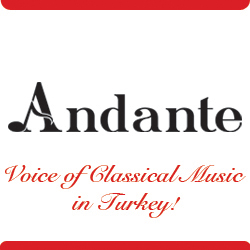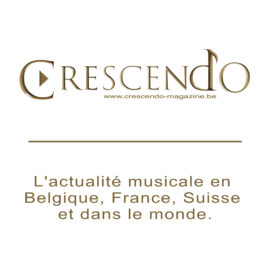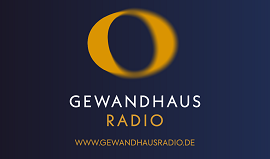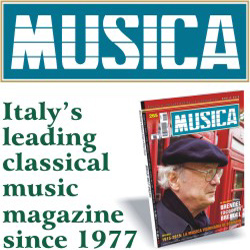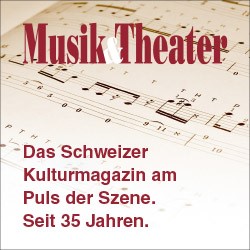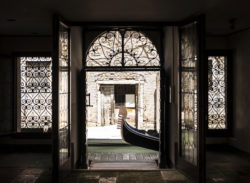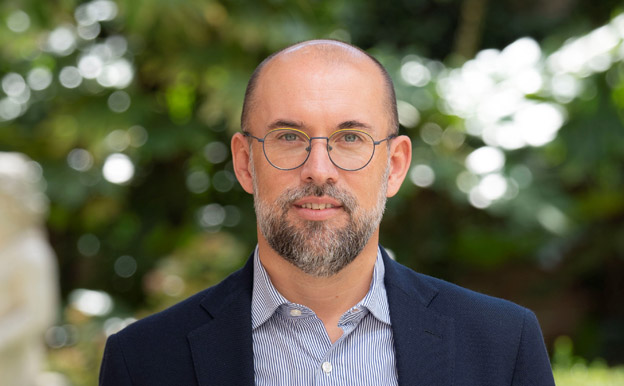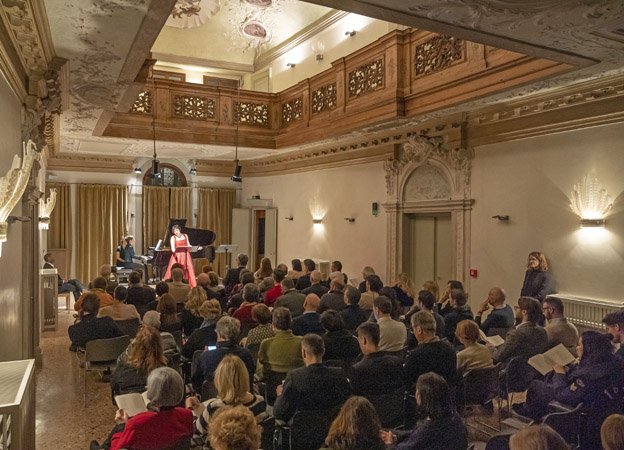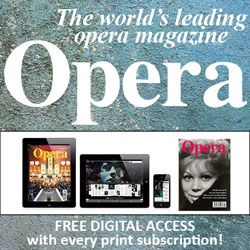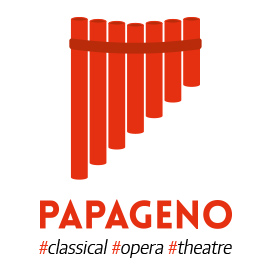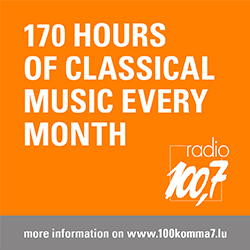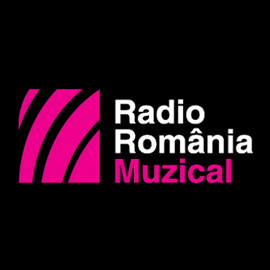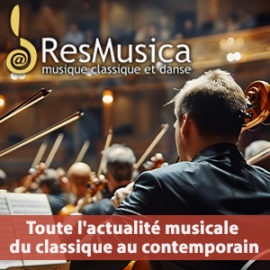What in 2009 might have seemed like a utopian undertaking is now an established reality in the field of musicological research and musical production: Palazzetto Bru Zane. Stefano Pagliantini from the Italian ICMA Jury member Musica talked with Alexandre Dratwicki, scientific director of the French Romantic Music Centre Palazzetto Bru Zane whose recording label is Label of The Year at the International Classical Music Awards (ICMA).
2024 marks an important milestone for Palazzetto Bru Zane: 15 years of activity at the highest levels, label of the year at the International Classical Music Awards (ICMA), winner of the “Premiere recordings” section with the recording, in the usual and luxurious format of the book — CD, of Ariane by Jules Massenet.
Tireless research and musical productions in major European and international centers: it all began in 2009 thanks to the will of Nicole Bru, a doctor and wife of a pharmaceutical industrialist, who purchased and restored it in 2006 to make it the headquarters of a Foundation dedicated to the study and dissemination of nineteenth-century French music. The other half of the name owes it to the Zane family (and Zanni is a topos in Laguna, it refers to the masks of the Commedia dell’Arte).
The Palazzetto Bru Zane immediately had a very specific mission, which it has consistently pursued in fifteen years of activity: French romantic music. Why this choice?
Unlike the Italian and German — and even English — repertoire, French music has long been limited to a few titles and a few composers. Many people, not only in Italy, know Mercadante and Cimarosa, the English Elgar and Wood, the Germans Spohr and Lortzing. But when it comes to French music, you never go beyond Bizet, Massenet, Saint-Saëns and Offenbach. This mission is still in its infancy, because we must not only rediscover this corpus, but also try to include it in international programming.
It was a challenge to bring French romantic music to Venice. Can you consider it a successful one?
Venice is a truly international city like few others. The Biennale, the Film Festival and the Carnival are events that radiate throughout the world and are known even by people who have perhaps never been to Venice. Even the work of the Palazzetto Bru Zane, more modestly, was built on this myth: many of our partners in Munich, Budapest and Paris have never been to Venice, but they identify with us and remember our work thanks to the magical aura of this mythical city.
How is the Foundation’s artistic activity structured between musical productions, recordings and musicological research?
Our credo: the sequence of professions and pragmatism. Pure research is important but, in our case, it must lead to tangible results: such as documentation on Bru Zane Mediabase, reproducible scores or record content that can be listened to and judged. For this reason, the impetus is generally given by programming, which is based on unavoidable deadlines. This sets medium- and long-term goals and helps maintain a daily work ethic. However, our research department often learns about incidental discoveries, which prove invaluable for future programs.
How are you organized internally?
Our departments (research and publishing, programming, communications, production, record label, administration) form small teams that have their autonomy, but each cultivates links with colleagues from other departments. This excellent specialization in each sector allows us to have very precise skills within us, while other institutions, and unfortunately, sometimes have to improvise jobs without really knowing them. Furthermore, each department is made up of between two and five people, which allows us to deal with sometimes divergent opinions to reach conclusions that are as objective and complete as possible.
How do you choose the authors and the music to work on?
Beyond our ‘historical obligations’ to honor Massenet, Saint-Saëns, Offenbach and others, in the two annual cycles, we try to alternate the periods of the great romantic century (between the time of Napoleon, the July Monarchy, the Second Empire, the Belle Époque, etc.), the styles (the Academicism of Dubois and Godard, the Symbolism of Séverac and Aubert, the Classicism of Reicha and Jadin) and the approaches (political with Napoleon, social with female composers, aesthetic with the turning point of the Great War). We also take advantage of the commemorations (Gounod 2018, Offenbach 2019, Saint-Saëns 2021, Franck 2022, Fauré 2024), which are always an opportunity to get the media interested in our work. And finally — but no less important — we do not give up on daring unlikely cycles, like Fernand de la Tombelle or Félicien David. We must try to surprise every time!
How did you create the network of partners around the world?
This is based on the ability to excite a partner who often — and understandably — does not have in-depth knowledge of this repertoire. This partner network is therefore essentially based on a quality human relationship that must be cultivated. We have been working with the Munich Radio Orchestra for 10 years, with the Flemish Radio Choir for 16 years, with Les Talens Lyriques for 14 years, and so on. The advantage of being a private facility is that we do not have to follow any development rules, unlike a commercial facility. And when things end, it’s a cycle that ends, often leaving behind some great recording results. Readers should know: everyone is invited to join the adventure!
Why are collaborative relationships with Italian musical institutions only occasional?
Since 2009 we have worked with many Italian institutions: La Fenice, the Accademia della Scala, the Orchestra of Padova and Veneto, Santa Cecilia, the Donizetti Festival of Bergamo, the Bari Opera and so on. Because of the uncertainty of state funding in Italy — and it’s not the only country in this situation — the difficult thing is maintaining a long-term relationship. Either the money runs out, or funding deadlines do not allow institutions to commit to a project by the time we close our brochure. But we still have good partnerships over time, like the one with the Orchestra of Padua and Veneto.
Among the projects developed in these 15 years, is there one that has given you particular satisfaction and that you would like to mention?
There were some works that I never thought I would listen to and record: Massenet’s Ariane, Saint-Saëns’ Déjanire, Félicien David’s Herculanum, to give just a few examples. But above all, the greatest emotion is linked to the great discoveries of well-known works in the repertoire: recording Gounod’s first Faust, revealing 40 minutes of unknown music from Offenbach’s Vie parisienne or having the scenography of Carmen from 1875 reconstructed. These are unforgettable moments for the entire Palazzetto Bru Zane team. It’s a way to enter the life story of a masterpiece.
Do you think that your pioneering work may have contributed to broadening the musical repertoire and that following your work artists, artistic directors and theaters have decided to include this repertoire in their programming?
It’s a long-term mission. But thanks to our work, festivals and operas have produced unexpected shows: David’s Herculanum in Wexford, Godard’s Dante in Saint-Etienne, Bertin’s Fausto in Essen, Holmès ‘ La Montagne noire in Dortmund, etc. And some symphonic and chamber music works begin to enter the repertoire, such as Strohl’s Cello Sonata « Titus et Bérénice ». There are tangible results. That’s encouraging!
Can you tell us something about the 2024 programming?
Our season highlights the importance of Gabriel Fauré in the development of the French style and his influence on pupils as diverse as Nadia Boulanger, Ravel, Enescu and Schmitt. The eclecticism of these personalities demonstrates that Fauré was not dogmatic and knew how to cultivate the specificity of each one. In Venice we will hear works by Cools, Masson, Aubert and many other composers who urgently need to be heard again. This cycle by Fauré will be performed in several countries, in particular in Canada, with which we have developed numerous collaborations: Salle Bourgie, Orchestre Symphonique de Montréal, Domaine Forget, Orchestre Métropolitain, Palais Montcalm, Les Violons du Roy, Orchestre Symphonique de Québec, etc.
Future projects?
Next season: Psyché by Ambroise Thomas… and much more!


